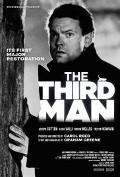
Directed by
Carol Reed
104 minutes
Rated PG
Reviewed by
Bernard Hemingway

The Third Man
Directed by Carol Reed from Grahame Greene's script, based on his own novella set in the corrupt world of black market post-war Vienna TheThird Man is often referred to as the best British film of all time, even one of the best films ever made. The memorable black and white photography by Robert Krasker, Reed's regular lensman, who picked up an Oscar for his efforts, notwithstanding, I’ve never been convinced by these claims.
Whilst Reed's directorial style here, initiated two years earlier with The Odd Man Out, is often impressive, full of Expressionistic lighting, low, tilted angles and skewed framing, all supplied by Krasker, on the downside it is also arguably obtrusive (the lighting effects too obviously created by hidden spotlights) whilst Joseph Cotten's unrelieved Dudley Do Right moral earnestness (he rats out Welles's Harry Lime, supposedly his best friend, without hesitation) and Trevor Howard's equally unrelieved self-satisfied righteousness drag the story down the path of sanctimony. The result is that while Lime's acts are so dastardly that it feels wrong, he, like Johnny in The Odd Man Out, earns our sympathy as the hunted man and so we are left on the sidelines as uncomfortable spectators.
Then there's Anton Karas' famous zither music, the film's theme song one of the most famous in all cinema history. What the zither has to do with post-war Vienna I do not know, but we barely get any relief from the damn thing which twangs along in virtually every scene at times with tremendous crescendos
Orson Welles is urbanely cynical and enigmatic as Harry Lime, who justifying his morally reprehensible acts famously utters the line to Joseph Cotten about the creative upsurge in Italy under the rapacious, murderous Borgias as opposed to the peace-loving Swiss whose contribution to world culture is the cuckoo clock (lines allegedly contributed by Welles himself, which he once claimed to have lifted from an old Hungarian play).
But this is not enough to justify the film's legendary status and to have made it the one most often associated with Welles even though, probably, with a nod to Joseph Conrad’s Heart of Darkness (one of the characters is called Baron Kurtz), he only appears in it towards the later stages. (Welles’s participation in the film was so limited that assistant director Guy Hamilton served as his double for many of the shots in the sewer, and Reed's fingers were used when Lime's hands emerge from a sewer grate).
FYI: There are two versions of the film, the British, released by producer Alexander Korda, has an introductory narration by Reed, the American, reshaped by David O. Selznick (who was responsible for changing the two main characters into Americans from their original British and the casting of Cotten and Alida Valli both of whom he held under contract) has one by Cotten and is some 10 minutes shorter (93 mins).
Want something different?





